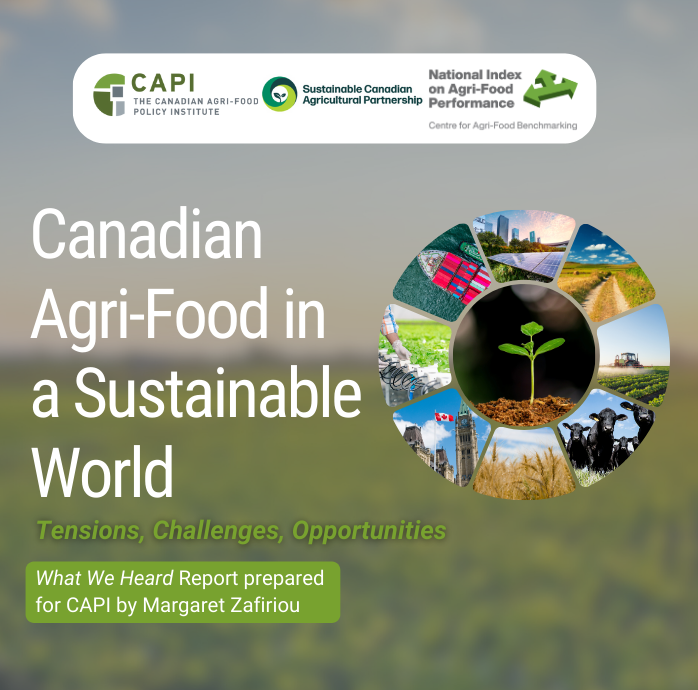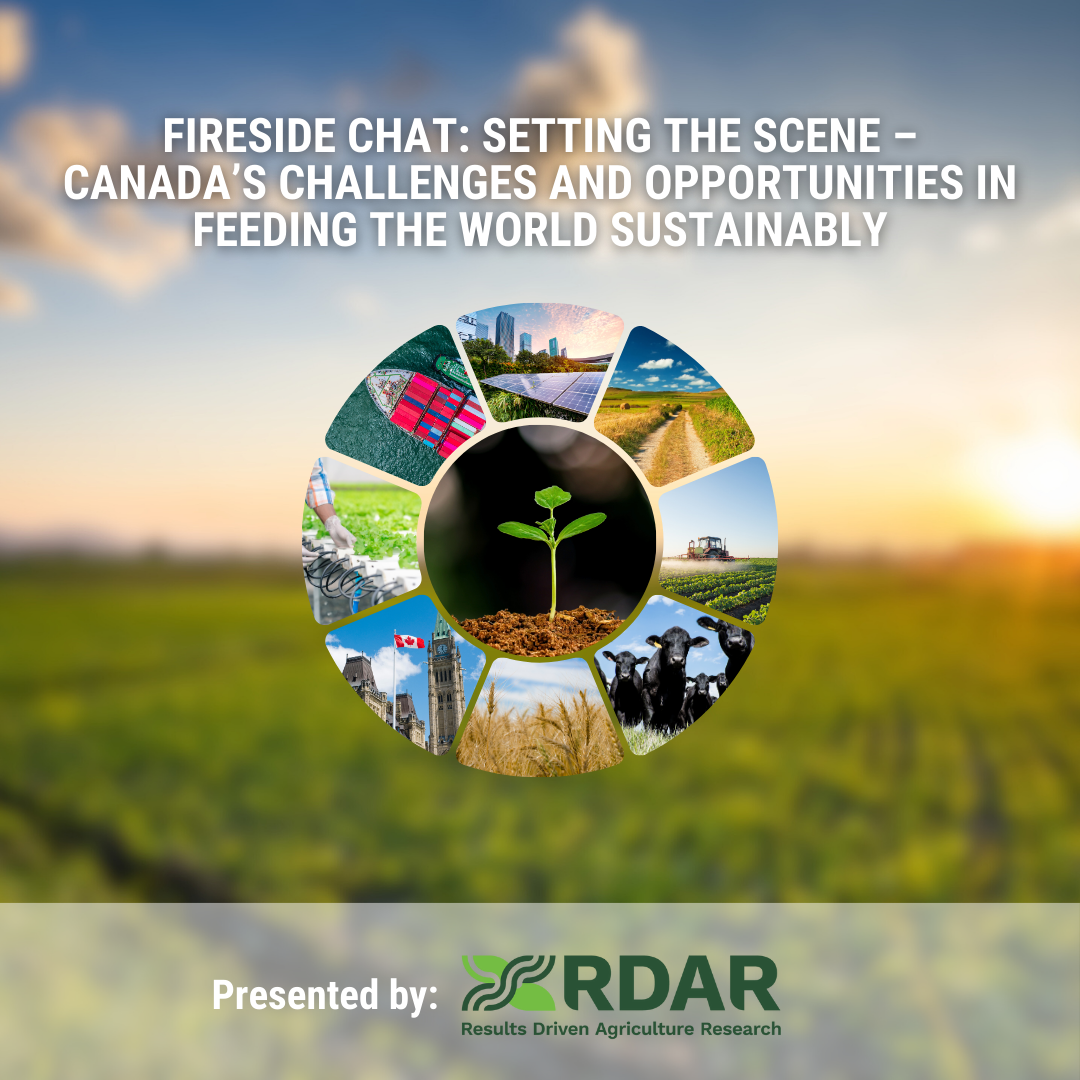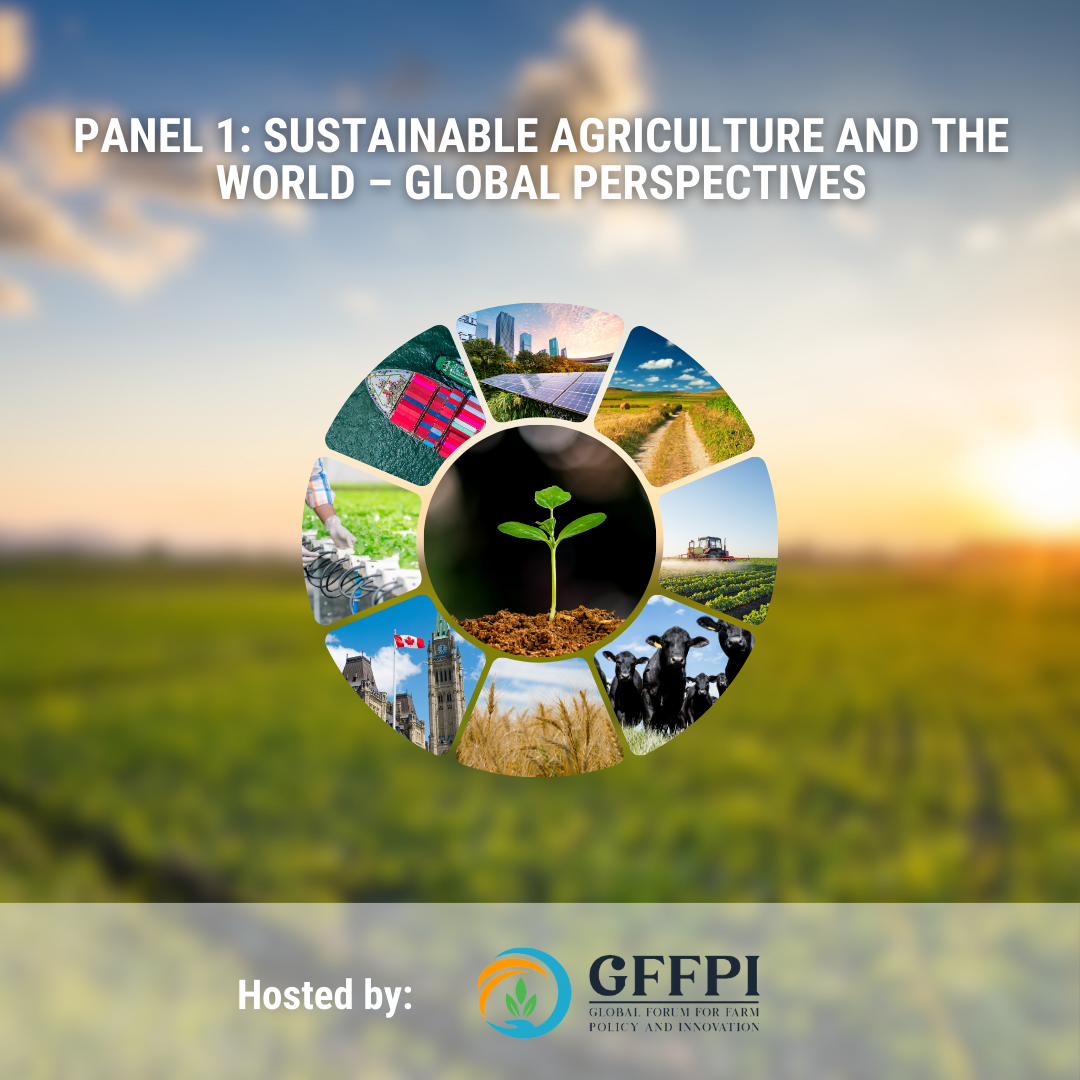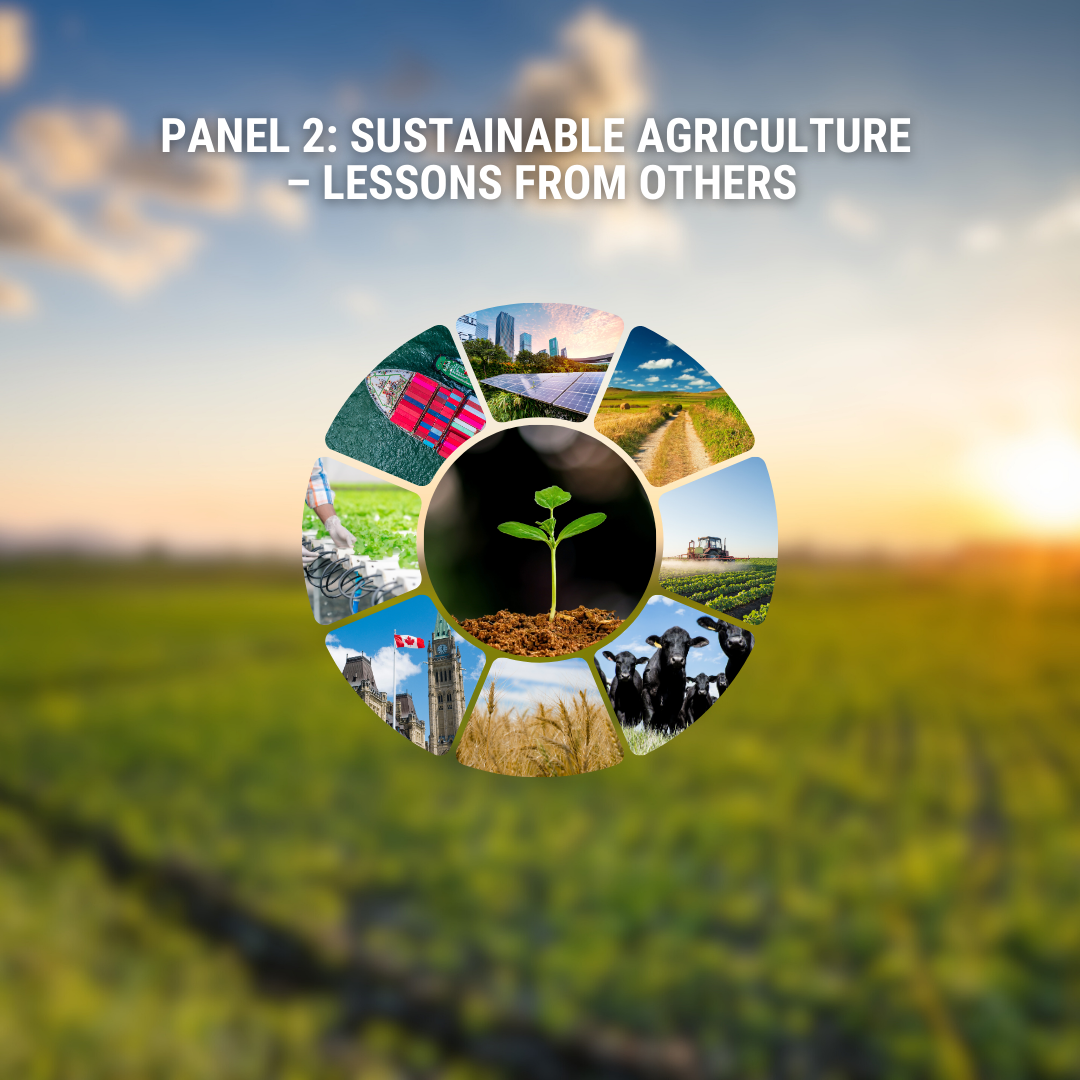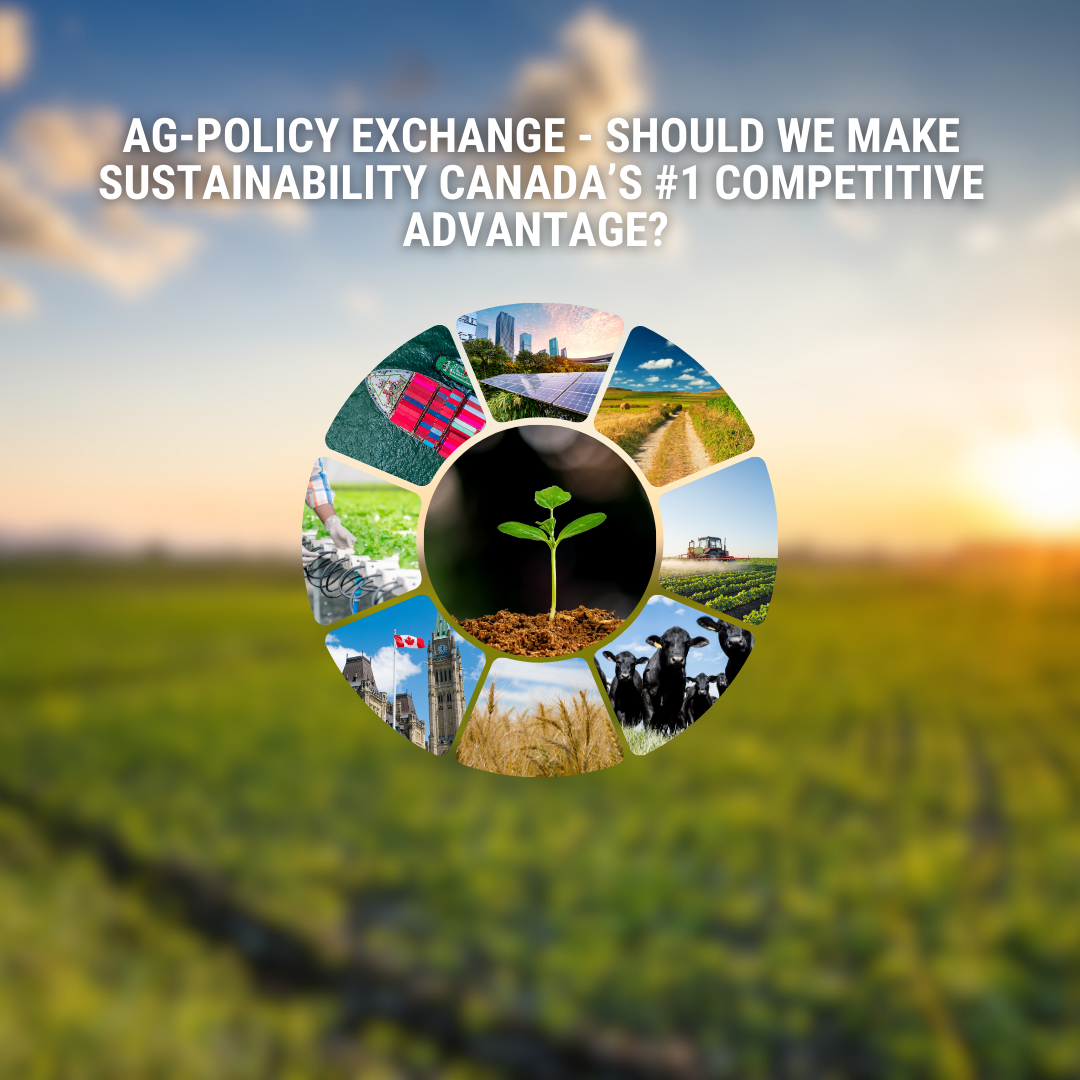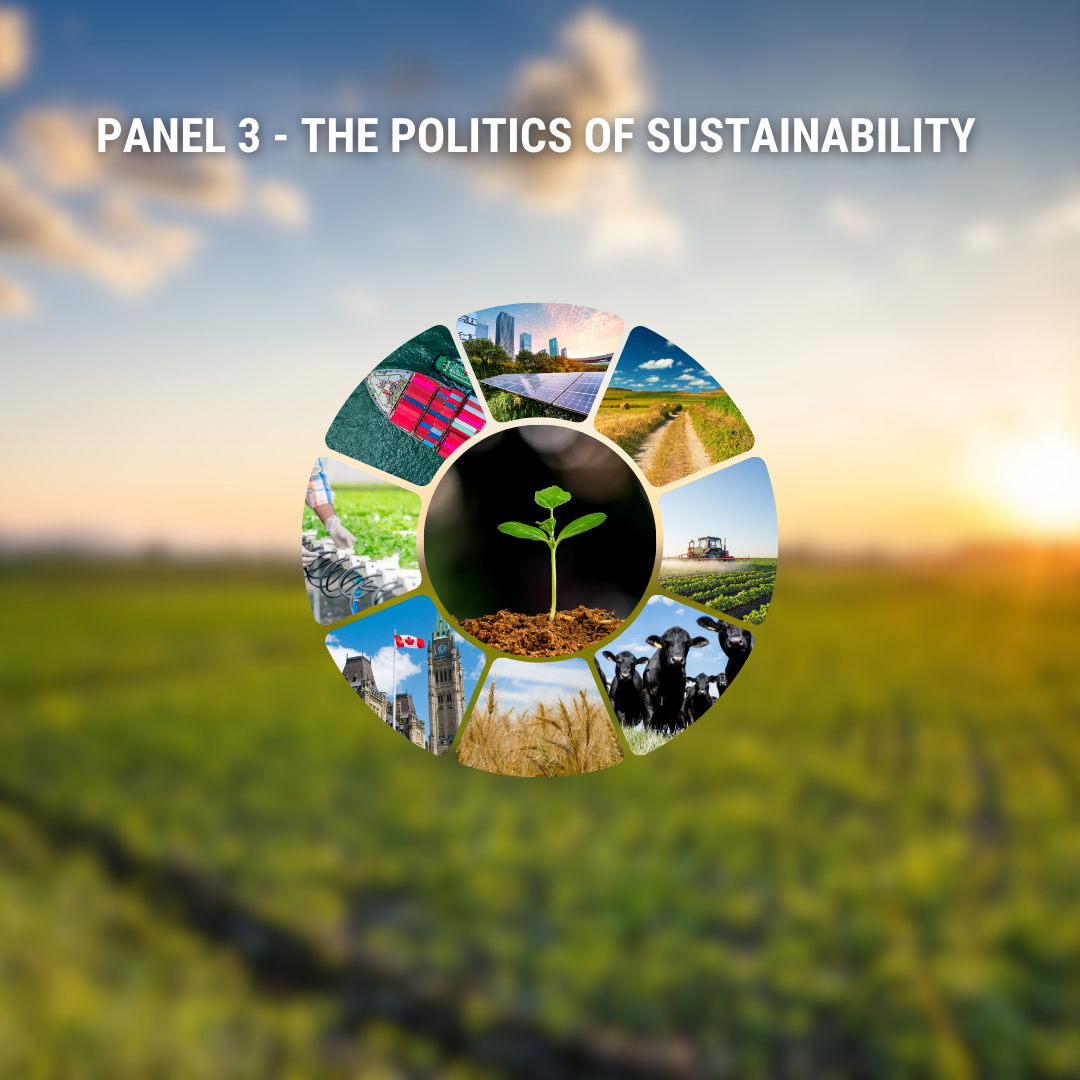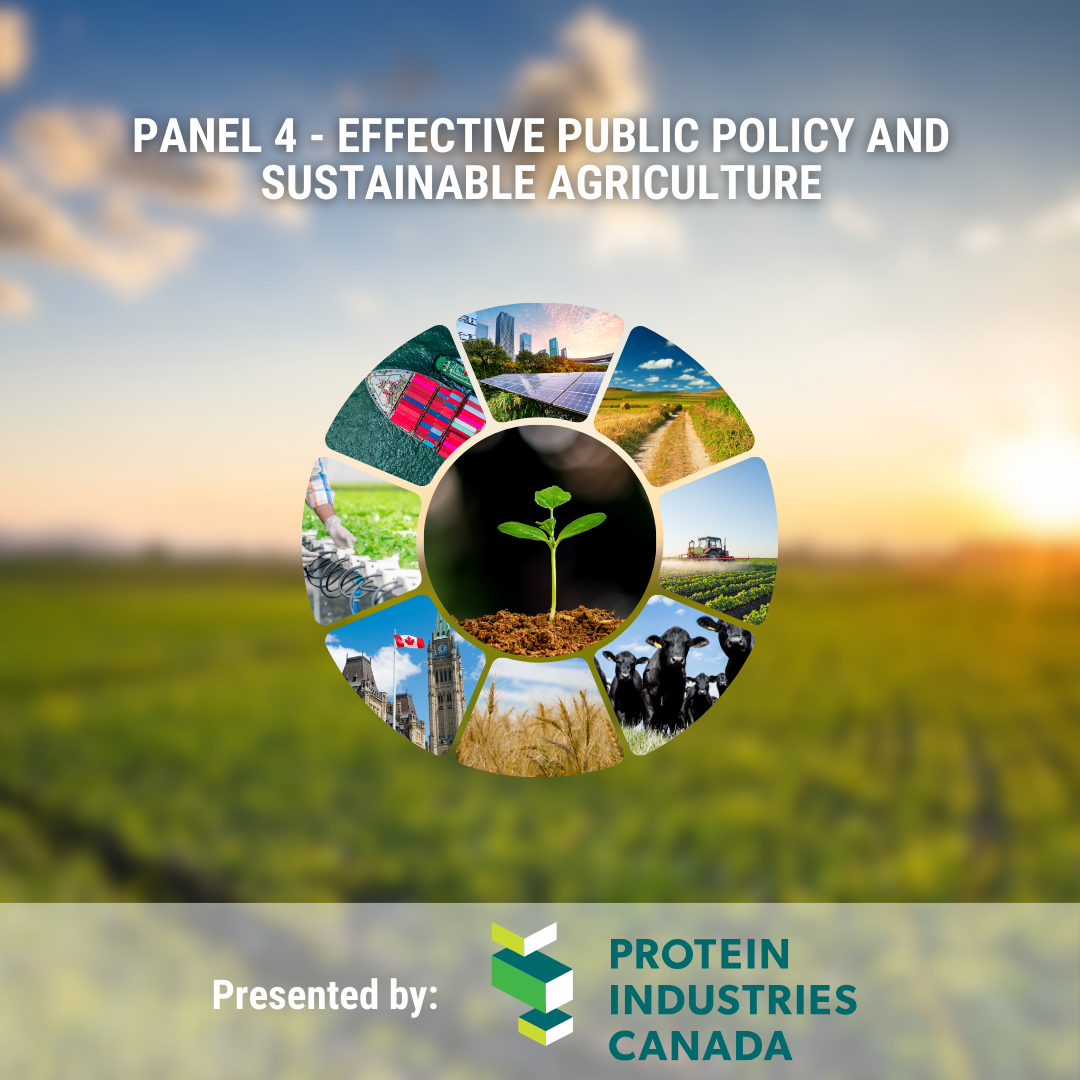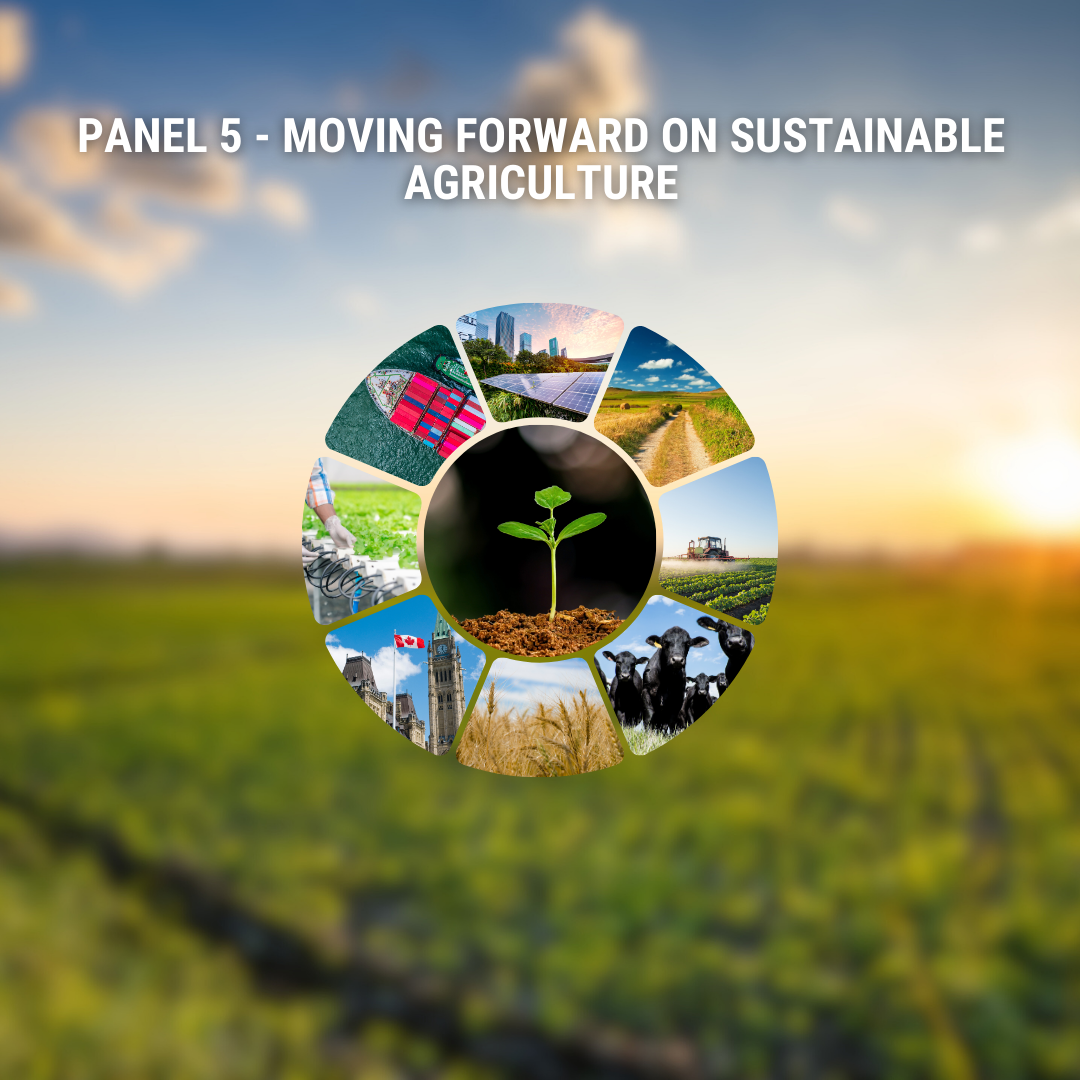
Thank you for attending this year’s conference, stay tuned for our session recordings.
We hope to see you October 1 & 2 2025!
Ag Policy Connection - Special Edition
The Ag Policy Connection Podcast is produced in partnership with RealAgriculture. As part of Canadian Agri-Food in a Sustainable World, three episodes of the Ag Policy Connection Podcast were recorded:
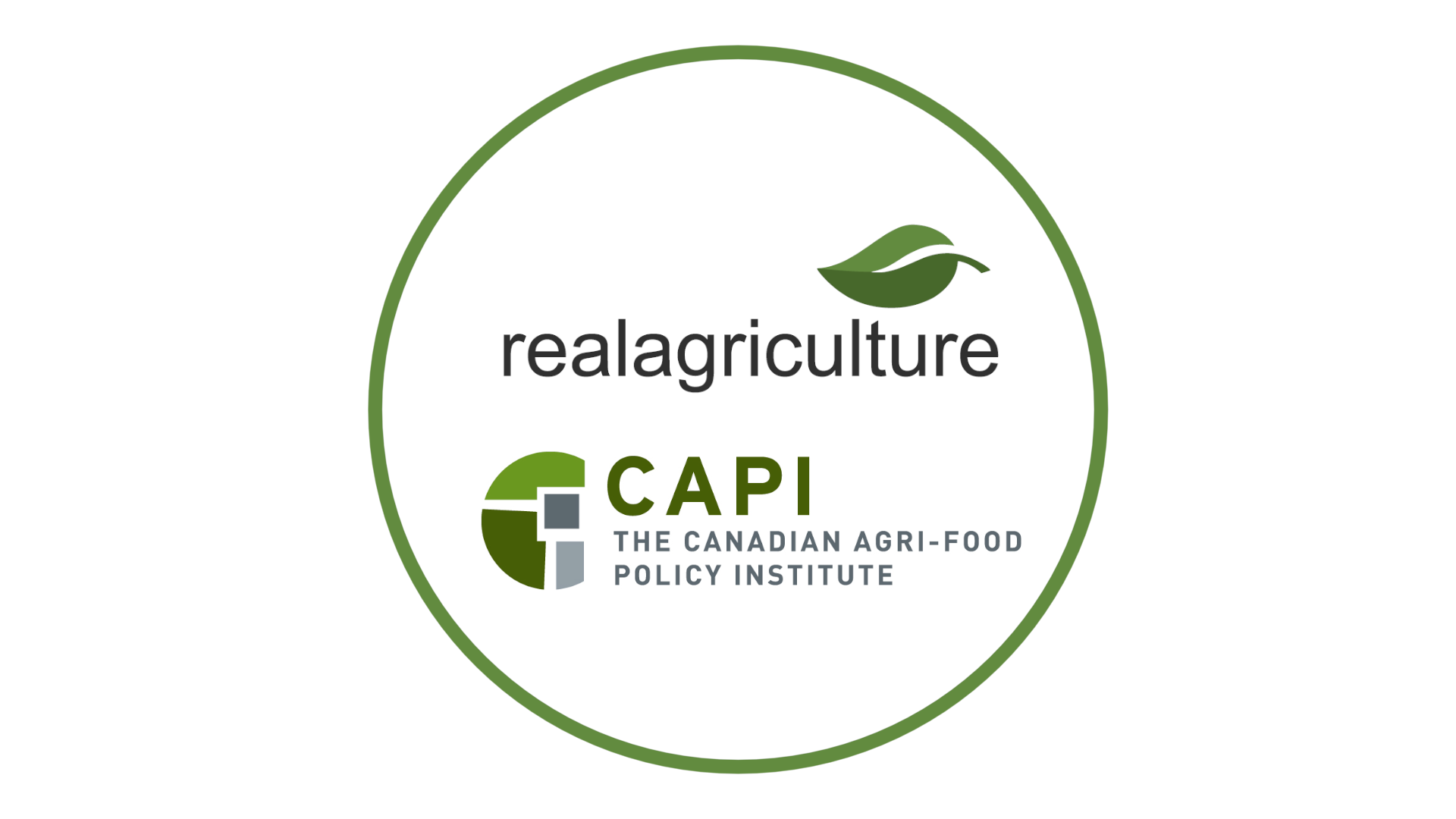
This podcast series was funded in part by Agriculture and Agri-Food Canada under the Sustainable Canadian Agricultural Partnership’s AgriCompetitiveness Program.
What We Heard
Day 1 Sessions
8:00 – 8:30 am
Registration & Networking
8:30 – 8:40 am
Welcome and Opening Remarks
Event MC: Darlene McBain, Director, Industry Relations, Farm Credit Canada
8:40 – 9:30 am
Fireside Chat: Setting the Scene – Canada’s Challenges and Opportunities in Feeding the World Sustainably
Addressing sustainability in an evolving landscape. Our understanding of agri-food sustainability, including the impacts this will have on the sector’s productivity and the avenues for improving sustainability continue to change. This session will set the stage by exploring that change, what we know, what we do not and what it means for the policy landscape in Canada and around the world.
Moderator: Rory McAlpine, Chair, CAPI Board of Directors
Justine Hendricks, CEO, Farm Credit Canada
Lloyd Day, Deputy Director General, Inter-American Institute for Cooperation on Agriculture (IICA)
9:30 – 10:30 am
Panel 1: Sustainable Agriculture and the World – Global Perspectives
Sustainability is a global challenge that requires countries to act nationally. It also requires action that promotes sustainable trade, boosts national and global food security, and increases prosperity for value-chains. Representatives from the Global Forum for Farm Policy and Innovation will share their perspectives on agri-food sustainability policies, trade-enabling solutions and how national approaches can deliver global solutions.
The Global Forum for Farm Policy and Innovation is a collaborative initiative between CAPI, the Australian Farm Institute, the Farm Foundation and the Forum for the Future of Agriculture.
Moderator: Claire Citeau, Distinguished Fellow, CAPI
Katie McRobert, Executive Director, Australian Farm Institute (AFI)
Shari Rogge-Fidler, President & CEO, Farm Foundation
Mark Titterington, Co-Founder and Director, Forum for the Future of Agriculture (FFA)
Carlos Salinas, Regional Director, U.S. Soybean Export Council (USSEC)
10:30 – 11:00 am
Networking Break
11:00 am – 12:00 pm
Panel 2: Sustainable Agriculture – Lessons from Others
Improving sustainability in agriculture requires action, investment, and value along the supply chain. However, agriculture has struggled to deliver sustainable value chains. This panel will explore the barriers and solutions from the perspective of other sectors, and what lessons can be learned from outside of agriculture and food.
Moderator: Darlene McBain, Director, Industry Relations, Farm Credit Canada
Derek Nighbor, President & CEO, Forest Products Association of Canada
Timothy Kennedy, President & CEO, Canadian Aquaculture Industry Alliance
12:00 – 1:00 pm
Lunch
1:00 – 2:00 pm
Ag-Policy Exchange: Should we make Sustainability Canada’s #1 Competitive Advantage?
Canadian agriculture and food face big challenges with the potential for different solutions that lead to diverse outcomes for the sector. None of those solutions or outcomes may be the right one, and dialogue and debate are essential to getting better policy outcomes. Instead of shying away from thoughtful debate, the sector should embrace it.
To support CAPI’s mission of advancing policy solutions, this policy exchange offers a platform for respectful debate and dialogue to explore diverse perspectives on critical policy issues. A panel of thought leaders from the sector will come together and each will offer their viewpoint on whether they believe sustainability is Canada’s #1 competitive advantage before moving into a more in-depth dialogue.
Moderator: Shaun Haney, Founder, RealAgriculture
Jean-Michel Couture, President and Partner, Group AGÉCO
Nick Betts, Managing Director, Canadian Alliance for Net-Zero Agri-food (CANZA)
Ben Gibbons, Founder & Managing Partner, Waterpoint Lane
Stuart Person, National Leader of Crop Services, MNP
2:00 – 3:00 pm
Panel 3: The Politics of Sustainability
This discussion will address the principles that should guide strategies, decisions, and policies related to sustainability. Is it environmental factors? Social? Competitiveness in global trade? Regardless of your stance on the topic, this lively conversation offers an important perspective of diverse viewpoints.
Moderator: Michael Harvey, Executive Director, Canadian Agri-Food Trade Alliance (CAFTA)
Alanna Koch, Board Chair, Global Institute for Food Security
Kate Harrison, Vice-Chair, Summa Strategies Canada
Scott Ross, Executive Director, Canadian Federation of Agriculture
Mike Wilson, Executive Director, Smart Prosperity Institute
3:00 – 3:30 pm
Networking Break
3:30 – 4:30 pm
Panel 4: Effective Public Policy and Sustainable Agriculture
Public policy is increasingly being used to try and improve sustainability outcomes in agriculture and food, however, the effectiveness of current approaches is up for debate. This panel of leaders will explore what sound policy looks like in today’s competitive agri-food landscape and consider what role governments should play in improving the sustainability of Canadian agriculture.
Moderator: Robin Booker, Editor, The Western Producer
Brent Preston, President, Farmers for Climate Solutions
Pierre Petelle, President & CEO, CropLife Canada
Dr. Mark Redmond, Chief Executive Officer, RDAR – Results Driven Agriculture Research
Steven Jurgutis, Director General, Policy Planning and Integration, Agriculture and Agri-Food Canada
4:30 – 5:30 pm
Panel 5: Moving Forward on Sustainable Agriculture
Turning sustainability from a challenge to an opportunity requires meaningful, substantive action, and no one link in the agri-food sector can do it on its own. The final panel will reflect on the day’s dialogue and consider what needs to be done, how it can be achieved, and will identify who the key stakeholders (including farmers, governments, industry, and civil society) are and what their role is.
Moderator: Tyler McCann, Managing Director, CAPI
Bryan Gilvesy, CEO, ALUS
Dori Gingera-Beauchemin, Board Member, CAPI
Sylvie Cloutier, CEO, CTAQ
Jim Eckberg, Senior Scientist, General Mills
5:30 – 5:40 pm
Closing Remarks
5:45 – 7:00 pm
Reception
Day 2 Sessions
8:00 – 8:30 am
Registration & Networking
8:30 – 8:50 am
Welcome and Opening Remarks
David McInnes, Founder and Senior Fellow, Centre for Agri-Food Benchmarking
Tarra Drevet, Executive Director, Centre for Agri-Food Benchmarking
8:50 – 9:50 am
ESG standards are coming! A closer look at ESG in a national and global context
Hear from standards-setters on what is happening as new national and global sustainability standards evolve and what this means for Canada’s agri-food sector.
Moderator: David McInnes, Founder and Senior Fellow, Centre for Agri-Food Benchmarking
Isabelle Mégré, Director, Montreal office, IFRS Foundation
Bruce Marchand, Interim Chair, Canadian Sustainability Standards Board (CSSB)
9:50-10:15 am
Networking Break
10:15 – 11:15 am
What ESG means for Canada’s agri-food sector
A panel of agri-food players – all part of Canada’s National Index on Agri-Food Performance coalition – react to these changes and offer their unique perspectives on the implications of evolving standards on competitiveness, getting aligned and building trust in the marketplace as such transparency increases.
Moderator: David McInnes, Founder and Senior Fellow, Centre for Agri-Food Benchmarking
Michelle Leslie, Senior Manager, Infrastructure & Capital Projects, Deloitte
Selene Munro, Director, Sustainability, United Farmers of Alberta Co-operative Limited
Greg Northey, Vice President, Corporate Affairs, Pulse Canada
Maxim Legault-Mayrand, Senior Manager of Government Affairs, Danone Canada
Natacha Houde, V.P Sustainable development, Inno-Centre
11:15 – 11:55 am
Breakout Discussion: Action for the Canadian Agri-Food System
What feedback do audience members have to respond to new ESG-related standards as they come on stream and how should the National Index on Agri-Food Performance evolve to remain relevant as sustainability reporting changes here and abroad?
11:55 am – 12:35 pm
Lunch
12:35 – 1:30 pm
Breakout Discussion Response Panel: Action for the Canadian Agri-Food System
Several participants will be brought back to the stage to help distil pertinent ideas about what needs to happen to respond to this ever-changing world of sustainability reporting.
Moderator: Tarra Drevet, Executive Director, Centre for Agri-Food Benchmarking
1:30 – 2:00 pm
The Canadian Agri-Food System in the New ESG Landscape
A quick synthesis will wrap up the discussion and flag some essential next steps.
Tarra Drevet, Executive Director, Centre for Agri-Food Benchmarking
Sponsors
Canadian Agri-Food in a Sustainable World wouldn’t be possible without the sponsors that have partnered with CAPI and the Centre for Agri-Food Benchmarking.












This conference was funded in part by Agriculture and Agri-Food Canada under the Sustainable Canadian Agricultural Partnership’s AgriAssurance Program.
Speakers
Darlene McBain Director of Industry Relations, Farm Credit Canada
Darlene was raised on a poultry farm outside of Quebec City. With farming in her heart and passion for the food industry, Darlene earned
a degree in agricultural science at Laval University. She began her career in the banking industry as an account manager helping ag and food business owners to grow and achieve their goals. Darlene also held various leadership roles including in sales and training before joining FCC in 2007 in a management position. With more than 25 years in the agri-food sector, Darlene has an in-depth understanding of industry trends, risks and opportunities, and shares her strategic insights to drive growth and build connections with stakeholders. She volunteers in several community organizations, is a member of the Order of Professional Agrologists of Quebec and is on the board for the Canadian Centre for Food Integrity. She also sits on the governance committee of the Canadian Agri-Food Sustainability Initiative
Justine Hendricks President and CEO, Farm Credit Canada (FCC)
Justine sits as FCC’s President and CEO after 17 years with Export Development Canada (EDC) and 7 years with Royal Bank of Canada (RBC). She is an impactful leader whose diverse experience includes delivering financial services on the front line, overseeing successful organizational transformations, evolving risk management capabilities, spearheading the development of innovative financial products, and developing and executing corporate strategies. Much of her career has been focused on lending to and supporting Canadian businesses across critical sectors, including agriculture and agri-food.
In her time at EDC, Justine was responsible for several different business functions including business development in the resources, forestry, seafood, agricultural equipment, light manufacturing and extractive sectors, the transformation of EDC’s Financing and Investment Group, and full responsibility for EDC’s $9B Insurance and Working Capital Solutions portfolio. Prior to leaving EDC, Justine was appointed to be EDC’s first Chief Sustainability Officer and was responsible for aligning EDC’s 10-year corporate strategy with evolving business principles and practices focused on the environment, human rights, and innovation.
Justine is known for her energizing leadership style, mobilizing and listening to her teams while making sure to put the client at the center of decisions.
Justine is a member of the University of Ottawa Board of Governors and currently sits on their Audit Committee. She also volunteers extensively and has served as Chair of the Digital Opportunity Trust and Chair of the Forum for Young Canadians.
Justine earned an MBA from the University of Ottawa and a Bachelor of Arts in Urban Studies from Carleton University. She is the recipient of several awards related to her inspirational leadership and community involvement.
Lloyd Day Deputy Director General, IICA
Mr. Lloyd C. Day is a United States citizen and assumed his position as Deputy Director General of the Inter-American Institute for Cooperation on Agriculture (IICA) on July 1, 2012.
He started his career with the Governor of California, eventually becoming the Deputy Secretary of International Trade and Investment for California. He then moved to Washington, D.C. to serve as Administrator of USDA´s Agricultural Marketing Service, Head of Federal Government Affairs at Syngenta, and now Deputy Director General of IICA.
Mr. Day has received a bachelor’s degree and master’s degree from Stanford University and the University of Glasgow.
Bryan Gilvesy CEO, ALUS
Bryan Gilvesy has led the development of the ALUS program since 2006. He is a champion for progressive, sustainable farming and ranching, having embraced these methods on his own farm, Y U Ranch, which has been producing grass-fed beef in Ontario’s Norfolk County since 1979. Bryan holds a degree from the Ivey School of Business at Western University, where he is also the Executive in Residence for Agriculture and Sustainability, and he has received many awards, including the Canadian Farmer-Rancher Pollinator Award, the Canadian Agri-Food Award of Excellence for Environmental Stewardship, the Beef Farmers of Ontario Environmental Stewardship Award, the Premier’s Award for Agricultural Innovation, and the Ontario Environment Minister’s Award for Environmental Excellence. His appointments have included the Ministers Species at Risk Advisory Council and the Ontario Bobolink Roundtable.
Michael Harvey Executive Director, Canadian Agri-Food Trade Alliance
Michael Harvey has been Executive Director of the Canadian Agri-Food Trade Alliance since July 2023. He has extensive Canadian and international experience in the private and non-profit sectors, as well as in government. For seven years he was Director of Corporate Affairs for the Latin American operations of the former Goldcorp, one of the world’s leading gold mining companies. He was also a Canadian diplomat for 15 years, with postings to the United Nations, Brazil, Colombia, and Venezuela. Michael was the President and CEO of the Canadian Council for the Americas and VP, Policy and International with the Canadian Chamber of Commerce.
Michael is a member of the Quebec Bar and holds a Master’s in International Commercial Law and Practice from the University of Edinburgh. He speaks fluent French, Spanish and Portuguese.
Isabelle Mégré Director, Montreal office, IFRS Foundation
Isabelle Mégré heads the Montreal office of the IFRS Foundation, which focuses on the development and implementation of the IFRS Sustainability Standards. Prior to joining the ISSB, Isabelle worked in the electricity sector, leading global multi-stakeholder initiatives aiming to advance the energy transition. She cumulates over 12 years of international experience in international affairs, stakeholder relations and sustainability.
She hold a Masters degree in International Studies – Cooperation, Development and Economy from the University of Montreal.
Bruce Marchand Interim Chair, Canadian Sustainability Standards Board
Bruce Marchand is an experienced energy sector executive following a prior career as a senior partner in an Atlantic Canadian regional law firm. Bruce is the Chief Risk and Sustainability Officer of Emera Inc., a public energy services company headquartered in Halifax, Nova Scotia with a strategic focus on transformation from high carbon to low carbon energy sources. Emera operates electric and natural gas utilities with assets in three Atlantic provinces, New England, Florida, New Mexico, and the Caribbean. As a leader at Emera, Bruce has held senior executive responsibility for several areas, including legal and regulatory affairs, securities laws, corporate governance, internal audit, ethics, compliance, insurance, enterprise risk management and sustainability. Prior to joining Emera, Bruce held various law practice leadership and management roles; practicing in areas of corporate and commercial law, including in the infrastructure, banking, and energy sectors. Bruce is a graduate of Acadia University (BA in Economics), Dalhousie Law School (LLB), and the Institute of Corporate Directors Program (ICD.D). He has been involved as a volunteer and leader in several professional, community and charitable organizations, including as a former Governor of the Atlantic Provinces Economic Council and as past Chair of the QEII Foundation’s Board of Trustees.
Alanna Koch Board Chair, Global Institute for Food Security
Alanna Koch is a farmer, industry leader, long-time agriculture champion, former senior government executive and experienced corporate director from Edenwold, Saskatchewan. She’s the Board Chair of the Global Institute for Food Security and CN Agricultural Advisory Council, sits on the board of SeedMaster Manufacturing and the Canadian Agricultural Hall of Fame and is an active member of the Global Farmer Network. She works with farmers and the agriculture industry through her consulting company, KoHert Agri Inc. Before this, she served as Deputy Minister to Premier Brad Wall and Cabinet Secretary and was the Saskatchewan Deputy Minister of Agriculture for nine years. Alanna has a long history of being involved in politics and policy, working in both senior political advisory roles to Premiers and Cabinet Ministers as well as working in executive leadership positions in the Saskatchewan public service. Alanna has been involved in the agriculture industry, both professionally and personally, for most of her life. She has a keen interest in government policy and has been closely involved in helping to influence, develop and implement policy. Some of her industry roles include President of the Canadian Agri-Food Trade Alliance and Executive Director of the Western Canadian Wheat Growers Association. Alanna has been widely recognized for her contributions to the agricultural industry and community.
Scott Ross Executive Director, Canadian Federation of Agriculture
After serving as CFA’s Assistant Executive Director since 2018, Scott Ross was promoted to the Executive Director position in 2022. Prior to that Scott served as CFA’s Director of BRM and Farm Policy for six years, where he covered a wide variety of agricultural issues. Scott’s policy work has given him a unique insight on how to develop and implement policy, while balancing a diversity of stakeholder interests. Scott has extensive experience in collaborating across the agri-food sector to achieve ambitious goals, most recently including co-founding the Agriculture Carbon Alliance, a coalition of 15 national farm associations advocating on behalf of farmers with regard to carbon pricing and environmental policies. Prior to his role at the CFA, Scott worked with the Economic Developers Council of Ontario and the University of Waterloo researching how municipal and regional governments can raise the profile of agriculture as an economic development priority.
Derek Nighbor President and CEO, Forest Products Association of Canada
Derek Nighbor was born and raised in Pembroke – in the heart of the Ottawa Valley – and has been President and CEO at Forest Products Association of Canada (FPAC) since March 2016. He is proud to represent Canada’s forest products sector and its workers, families, and communities nationally and internationally. In addition to his role at FPAC, Derek serves as the industry representative and advisor to the United Nations Forum on Forests (UNFF) and is the Past President of the International Council of Forest & Paper Associations (ICFPA) – an organization of forest sector leaders from 28 countries around the world. Derek is also a member of the Board of Directors of FPInnovations, Canada’s leading forest sector research institute.
Pierre Petelle President and CEO, CropLife Canada
Pierre Petelle is the president and CEO of CropLife Canada, the trade association that represents the Canadian manufacturers, developers and distributors of pest control products and plants with novel traits. Pierre joined CropLife Canada in 2008 and is now responsible for the strategic direction and leadership of the association.
CropLife Canada’s goals include improving public confidence in our members’ technologies, facilitating a positive regulatory environment, ensuring proper stewardship of our industry’s products and building collaborative stakeholder relationships.
Prior to joining CropLife Canada, Pierre worked in the policy office at Health Canada’s Pest Management Regulatory Agency where he worked on a wide range of issues relevant to Canada’s plant science industry. Pierre holds degrees from Carleton University and the University of Guelph.
Katie McRobert Executive Director, Australian Farm Institute (AFI)
Experienced in the fields of policy research, editing, communications, and project management, Katie McRobert has been part of the Australian Farm Institute team since late 2017, holding roles as Senior Researcher and General Manager before becoming Executive Director in April 2024. Prior to joining AFI, Katie worked as a global Content and Community Manager for Rabobank, liaising with farming clients to build knowledge banks, and as the National Editor for FarmOnline. Katie has an MBA from Griffith University specialising in Sustainable Business. She is currently Chair of the CSIRO Drought Resilience Mission Advisory Group, and a member of the NSW Environmental Trust Biodiversity Technical Review Committee, the federal Australian Agricultural Traceability Governance Group, the CSIRO Agriculture & Food external advisory group, and the NSW Farm Writers Committee. At the AFI, Katie’s role gives her the opportunity to deep dive into evidence-based policy research focused on the sustainability of agrifood systems – work she feels proud and privileged to be part of.
Timothy Kennedy President & CEO, Canadian Aquaculture Industry Alliance
Timothy Kennedy began his work leading the national association for Canada’s seafood farming sector in April 2017 as President & CEO of the Canadian Aquaculture Industry Alliance (CAIA). He’s passionate about the future and potential of sustainable seafood farming for Canada and the world.
Tim has worked for over 20 years in Ottawa with experiences as a political and policy advisor, a senior government relations consultant working with leading clients in the natural resources and sustainability sectors, and as a Vice President for a major North American energy company.
Kate Harrison Vice-Chair, Summa Strategies Canada
Kate Harrison is Vice Chair and Partner at Summa Strategies, a government relations and public affairs firm headquartered in Ottawa. Kate specializes in communication and consumer issues, with a focus on defence, technology, transportation and retail sectors. Prior to her time at Summa, Kate served as an aide to a Conservative Member of Parliament on Parliament Hill, and maintains an active association with conservative parties at a federal and provincial level. A seasoned political observer and campaign strategist, Kate is a frequent commentator on national television and radio programs, including CBC’s Power and Politics. She has two young children, and is a die-hard fan of the Buffalo Bills.
Jean-Michel Couture President and Partner, Groupe AGÉCO
Jean-Michel is an agricultural economist from Laval University (Québec, Canada). He joined Groupe AGÉCO in 2011. In 2013, he was appointed to the roles of Senior Consultant and Partner. In May 2023, Jean-Michel was nominated as President to spearhead the company’s development.
As an agricultural economist, he has gained experience in the fields of agricultural policy, international trade legislation, and trade analysis. As an expert in the field of corporate responsibility applied to the agri-food sector, Jean-Michel has been involved in several Canadian and European projects involving the review, analysis, and development of sustainability standards.
Over the years, he participated in the development and implementation of new approaches to assess and report on sustainability performance in a comprehensive way, including the social life cycle assessment methodology. Jean-Michel was involved in numerous projects of national and international scope which gave him a solid and detailed understanding of the specific challenges and opportunities facing the Canadian agricultural industry.
As an experienced communicator, Jean-Michel has been called since 2009 to speak at various events on topics of interest in the agri-food industry globally.
Nick Betts Managing Director, Canadian Alliance for Net Zero Agri-food (CANZA)
Nick is an action-driven, strategy-guided leader in building and deploying opportunities that drive positive climate impact across the agri-food industry. Through his years working in agricultural sustainability, Nick brings to CANZA a robust international industry and academic network, experience in leading global initiatives in climate-smart agriculture and a deep seeded understanding and awareness of Canadian agriculture and farming communities. His unique perspective and experiences catalyze innovative and implementable solutions from boots to boardroom.
Stuart Person National Leader of Crop Services, MNP
Stuart is MNP’s National Leader of Crop Services.
Based in Edmonton, Stuart brings more than 30 years of experience in agriculture, specializing in the grain, oilseed and pulse industry, to his role. Passionate about the agriculture industry, he grew up on a farm and continues to participate as a producer. This experience allows Stuart to relate first-hand to what Canadian agricultural producers face on their operations — and gives him greater insights into how to help producers overcome challenges and achieve their business goals.
Stuart works with agricultural producers, associations, and other industry stakeholders on a daily basis, providing insight into the complex issues affecting the industry. He has extensive experience as an agriculture business advisor with MNP and has helped clients from coast-to-coast deal with issues such as succession, risk management planning, taxation planning, digital adoption, and many more.
His involvement and dedication include serving on the board of directors of Farm Management Canada (FMC-GAC) and on the Canadian Agri-Food Policy Institute (CAPI). Stuart is also a proud member of the Canadian Association of Farm Advisors (CAFA, 2008).
Stuart earned a Bachelor of Commerce (BComm) with Distinction from the University of Saskatchewan in 2000. He is a Chartered Professional Accountant (CPA), qualifying in 2003.
Michelle Leslie Senior Manager, Deloitte
Michelle is an atmospheric physicist (climate scientist) and journalist. She has spent the last 15+ years’ supporting industries, clients and communities on climate-related initiatives including understanding the physical and transition risks of climate change and the financial and social impacts of these risks.
An experienced engagement executive, Ms. Leslie has deep relationships and a record of convening leaders across sectors to align on common goals to drive impact. As a policy leader and strategist, she drives strategies and solutions through policy and regulatory analysis and awareness-raising; external market eminence and connectivity; and leading public engagement via various engagement channels including thought leadership, climate literacy and partnerships. Ms. Leslie has extensive and varied experience navigating the decision-making structures and processes within government, in both line ministries and central agencies and has led initiatives across multiple jurisdictions.
Steven Jurgutis Director General, Agriculture and Agri-Food Canada
Born in Montréal and raised in London, Ontario and Ottawa where received an Undergraduate degree in Communications with a Concentration in Political Science from the University of Ottawa.
He spent a few years working for marketing communication companies and on various contracts with the federal government before becoming a public servant at National Defence where he worked for nearly seven years in various communications positions, including as the Press Secretary to the Minister. For the past nineteen years, he has worked at Agriculture and Agri-Food Canada in various communications positions, and for the past five years, has been the Director General, Policy Planning and Integration in the Policy Branch where he is responsible for the forward planning and integration of departmental policy, developing agricultural policy frameworks, federal-provincial-territorial relations, Cabinet Affairs and numerous policy files including Indigenous and Diversity policy, innovation, labour and regulations.
Married with two kids, he spends his free time playing drums and percussion different bands, biking, skiing, and spending time in his woodworking shop.
Ben Gibbons Founder and Managing Partner, Waterpoint Lane
Ben is an experienced investor with extensive capital raising and transaction expertise for growth stage companies. He has more than 18 years of deal experience with a proven track record of private company exits to strategic buyers, private equity firms, and capital markets with transactions exceeding $2 billion. He has a strong background in sustainability, leading investments in agtech and foodtech companies with a focus on advising founders and management on strategic planning, financing strategy and impact.
Selene Munro Director of Sustainability, United Farmers of Alberta Co-operative Ltd. (UFA)
Selene Munro is the director of sustainability at United Farmers of Alberta Co-operative Ltd. and is responsible for setting up and leading the co-operative’s sustainability initiatives and Environmental, Social, and Governance (ESG) reporting.
Selene is a certified Human Resource (HR) professional with over 20 years of direct HR experience. She has overseen all core HR functions, including compensation, benefits, pension, payroll, employee relations, learning and development, and recruitment. She has also worked in operations, leading eCommerce, and was responsible for the website’s initial development, supporting business processes, strategic business plans, and sales.
Selene holds a Bachelor of Commerce Degree from the University of Calgary and is a Certified Human Resource professional (CHRP). She also holds an Environmental, Social, and Governance Reporting Certificate from Mount Royal University. Her work experience has spanned multiple industries including manufacturing, telecommunications, utilities, downstream petroleum, and agriculture.
Brent Preston President, Farmers for Climate Solutions
Brent Preston and his wife Gillian Flies own and operate The New Farm, an organic vegetable operation near Creemore, Ontario. They specialize in cut salads for the wholesale and foodservice market, and provide produce to some of the best restaurants in Canada. Brent is past President of the Ecological Farmers Association of Ontario and President of Farmers for Climate Solutions, a pan-Canadian coalition of farm organizations that advocates for better climate policy in agriculture. He is the author of The New Farm: Our Ten Years on the Front Lines of the Good Food Revolution, a national bestseller. Prior to launching his farming career, Brent worked as a human rights investigator, election observer and journalist on four continents.
Greg Northey Vice President, Corporate Affairs, Pulse Canada
Greg Northey is the Vice President, Corporate Affairs for Pulse Canada. Before joining Pulse Canada in 2014, Greg was the Director of Environmental Policy with the Canadian Federation of Agriculture, a position he began in 2008. Prior to this, Greg worked with United Nations Industrial Development Organization in Vienna and with the American Chamber of Commerce to the European Union in Brussels. Greg is focused on resolving issues and identifying opportunities for the pulse sector in the areas of market access, trade, sustainability and transportation.
Natacha Houde V.P Sustainable development, Inno-Centre
Natacha has been working in the manufacturing sector for over 20 years. She has developed in-depth expertise in the fields of environment, automation, manufacturing operations, quality, product development and operational efficiency. Her proven ability to define a global and strategic vision of operations management in the manufacturing sector is undeniable.
Maxim Legault-Mayrand Senior Manager of Government Affairs, Danone Canada
Maxim Legault-Mayrand is the Senior Manager of Government Affairs at Danone Canada. With a career in the agri-food sector, Maxim has a keen interest in plastics and environmental sustainability. He specializes in public policy and strategic communications, playing a pivotal role in helping Danone engage with government bodies and promote health through food to as many people as possible. Maxim is the proud father of Alice.
Shari Rogge-Fidler President and CEO, Farm Foundation
Shari Rogge-Fidler joined Farm Foundation as president and CEO in 2019. She has a unique perspective, developed through her experience as a fifth-generation farm owner and operator, entrepreneur in the organic branded food industry, and founder of an agribusiness consulting firm. Shari was also CEO of a group of companies serving 1,000 farmers. She has lived and worked abroad for many years, including London in financial services and across Europe with the Boston Consulting Group. Shari has served on several corporate boards, including Farm Credit Mid-America and Coastal Pet. She currently serves on the board of GroGuru, an AgTech company, and as a trustee for The Nature Conservancy. Shari has a B.Sc. in Business Administration from the University of Kansas and an MBA from the Harvard Business School.
Shaun Haney Founder, RealAgriculture
Founder of RealAgriculture, Shaun Haney manages one of the leading industry ag media companies for Canadian farmers and ranchers. RealAgriculture provides the latest in ag policy, agronomics, current events and farm management from their website, radio shows, and podcast streams. Shaun is the host of RealAg Radio which is broadcast across North America on Rural Radio Channel 147 on SiriusXM daily at 4:30 PM Eastern, and also makes regular appearances on RFD-TV, Agritalk and US Farm Report. Together with Justin Funk of Agri Studies, Shaun helms RealAgristudies, a market insights partnership formed in 2019.
Sylvie Cloutier CEO, CTAQ
Sylvie Cloutier is a front-line player in Quebec’s agri-food sector. She has been working in strategic roles in the sector for more than 25 years. She has been with the Quebec Food Processing Council (CTAQ) since 2002, first as Vice-President, Communications and Public Affairs and since 2010, she holds the position of President and CEO. Between 1999 and 2003 Sylvie served as Vice-President of Communications and Executive Director of the Canadian Grand Prix New Products Awards at the Canadian Council of Grocery Distributors.
Over the years, Sylvie has earned the utmost respect from stakeholders in the Canadian agri-food sector who recognize her strength, integrity and ability to rally people around common goals. She has served on several boards over the years, including Aliments du Québec, Éco Entreprises Québec, the Quebec Industrial Research Center (CRIQ) and the Canadian Center for Food Integrity. In addition to FCC, she currently sits on the boards of Food Banks Canada, Food and Beverage Canada and Moisson Montréal. She also co-chairs AAFC’s Canadian Food Policy Advisory Council. Prior to being involved in the food industry, Sylvie worked for the global firm Hill + Knowlton Strategies Canada and in different advisory positions for the federal government.
Jim Eckberg Senior Scientist, General Mills
Jim Eckberg is a Research Scientist at General Mills. He leads programs that empower farmers with on-farm data to drive sustainable solutions that improve farm economics. Jim works with farmers, their advisors, and scientists to reduce emissions in the dairy industry. He translates this work to business leaders to rethink and reimagine the way industry invests in sustainability programs focusing on practical farmer-led approaches. Jim completed a Masters in ecology (University of Nebrask-Lincoln) and PhD in agroecology (University of Minnesota).
Mike Wilson Executive Director, Smart Prosperity Institute
Raised in New Brunswick, Mike began his career as an environmental lawyer in Toronto, left to become senior policy adviser to the federal Environment Minister, and then went on to hold a series of increasingly senior roles in the Government of Canada working at the intersection of the environment, economy and innovation.
Robin Booker Editor, The Western Producer
Robin Booker was raised on a mixed farm near Roblin, Man. and later ran the property as a grain farm while working as a treatment worker for a child and family service agency.
He has an honours degree in sociology from the University of Alberta, a bachelor’s degree in journalism from the University of Regina, and has worked at The Western Producer for the past 11 years as a reporter and editor.
He resides in Saskatoon, Sask. with his wife and two boys who are still growing into the lawnmowers waiting for them at the farmyard in Roblin.
Mark Redmond Chief Executive Officer, RDAR - Results Driven Agriculture Research
Mark was born in Liverpool, England and is proud to be a settler in Canada, having spent most of his life in Alberta. He trained at the University of Alberta as an infectious disease specialist. He later became a member of the VIDO team at the University of Saskatchewan, developing the world’s first genetically engineered livestock vaccines.
From the veterinary world, his career diverged into value-added agriculture as he took research from the lab to international markets as CEO of five companies. Throughout his career, he transformed ideas into innovation in agriculture and health; and counselled people and organizations to be the best they could be.
In March 2021, Dr. Mark Redmond became RDAR’s CEO. RDAR presents Mark with the opportunity to use all of his experience to benefit agriculture in Canada.
Carlos Salinas Regional Director U.S. Soybean Export Council (USSEC)
Carlos Salinas currently holds the position of Regional Director for the Americas at the US Soybean Export Council. In his role, Salinas is responsible for devising and executing market and trade development strategies for US SOY in the region. Before taking on this position, he worked as Senior Director for U.S. Soybean Meal.
Prior to joining USSEC, Salinas served as the head of Bunge’s U.S. feed grains desk. In this role, he was responsible for aligning the company’s global strategy in North America, managing cash and futures trading exposures, and overseeing the direction and execution of commercial strategy. Over the course of his career, Carlos has worked with a variety of commodities, with a particular focus on oilseeds, feed grains, and vegetable oils. He has held positions with Bunge and ADM in the U.S., Germany, Brazil, Singapore, Mexico, and Bolivia.
Mark Titterington Co-Founder & Director, Forum for the Future of Agriculture
Mark Titterington has enjoyed a long career in the agri-food sector having previously worked for Syngenta where he held a number of senior leadership and executive level positions in corporate affairs and business sustainability in the EAME region and globally. After leaving Syngenta in 2017, Mark became Chief Executive of EngineeringUK, a not-for-profit organization dedicated to inspiring and nurturing STEM skills in young people. He then joined Indigo Agriculture in 2019 and today leads the company’s corporate affairs and marketing team.
Mark is a Co-founder and Director of the Forum for the Future of Agriculture and hosts the organization’s Food Systems Podcast Series. He is a Senior Fellow at the Transatlantic Policy Network and started his career at the United Nations working on agri-food trade issues.
Claire Citeau Distinguished Fellow, CAPI
Claire Citeau is an accomplished international trade policy expert and advisor with extensive experience in global relations and public affairs. She is a Fellow at the Canadian Agri-Food Policy Institute (CAPI) and the University of Ottawa’s Graduate School of Public and International Affairs (GSPIA), as well as a Fellow of the Canadian Global Affairs Institute (CGAI).
Claire serves as Vice-President at the Canadian Meat Council and senior advisor at the Canada-EU Trade and Investment Association (CEUTIA). As former Executive Director of the Canadian Agri-Food Trade Alliance (CAFTA), Claire worked on numerous bilateral and multilateral free trade agreements including CETA, CPTPP, CUSMA, UKCTA and WTO agreements and contributed to improving the conditions of access for Canadian food around the world. She has held positions with Alberta’s Ministries of Global Affairs and Agriculture, RBC Dominion Securities, and the Historica Foundation of Canada.
Claire holds a double MBA in international business and is pursuing an LLM in international law (2025). She leverages her expertise to manage collaborations with key stakeholders, government officials, and industry leaders in Canada and abroad.
Dori Gingera-Beauchemin CAPI Board Member, CAPI
Dori was born and raised in rural Manitoba and graduated from the University of Manitoba with a Bachelor of Science in Agriculture. During her 44 year career with the Manitoba Department of Agriculture, she held positions reflecting the diverse aspects of the agriculture industry including youth and rural development, food production, policy, federal-provincial relations, marketing and trade, farm management and environment sustainability. Following her retirement in 2023 as Deputy Minister; Dori joined organizations that reflect her interest areas including Protein Industries Canada(PIC), Protein Manitoba, Farmers Abroad Canada and Canadian Agri-Food Policy Institute(CAPI). Dori and her husband Paul own and operate the family farm located south of Winnipeg.
Rory McAlpine Chair, CAPI Board of Directors
Residing in Victoria, BC, Rory McAlpine retired in 2020 as Senior Vice President, Government and Industry Relations with Maple Leaf Foods Inc. In addition to CAPI, he is a board member of Invest in Canada, a member of the Food from Thought Advisory Committee (University of Guelph) and Director and Past Chair of the James Bay Community Project.
For fifteen years at Maple Leaf Foods, Mr. McAlpine led the company’s engagement with government and industry partners on matters of public policy, programs, regulatory affairs and international trade. Mr. McAlpine served as Deputy Minister of the B.C. Ministry of Agriculture, Food and Fisheries from 2002 to 2005. Prior to that he obtained significant experience with Agriculture and Agri-Food Canada as Director General of the International Trade Policy Directorate; Executive Director of the National Farm Products Council; Director of the Grains and Oilseeds Division; and Deputy Director of Multilateral Trade. Mr. McAlpine started his career as a Trade Commissioner with the Department of Foreign Affairs and International Trade in 1982, with postings to Ottawa, Edmonton, Kuwait, Bangkok and the Canadian Mission to the EU in Brussels.
Mr. McAlpine received an M.A. (Hons) degree in Economics from the University of St. Andrews in Scotland and has also studied at the University of Geneva in Switzerland.
David McInnes Senior Fellow and Founder, Centre for Agri-Food Benchmarking
As Principal of DMci Strategies, David is a strategic advisor, speaker and facilitator on change and the opportunities facing the Canadian and global food system.
As part of this role, he is the Founder and National Coordinator of a private-public coalition of some 136 partners to develop Canada’s first agri-food sustainability index, the National Index on Agri-Food Performance.
David is a Member of the Agricultural Research Institute of Ontario (ARIO), an Arrell Food Fellow with the Arrell Food Institute at the University of Guelph, an Affiliate of McGill University’s Institute for Global Food Security, and he is a Global Advisor with Invest Nova Scotia.
Previously, David was the President and CEO of the Canadian Agri-Food Policy Institute. He has also held executive management positions with MDS Nordion, a Canadian-based global supplier of medical isotopes and cancer treatment technologies. He has also worked for the Canadian Bankers Association, Scotiabank, and a Royal Commission on the Canadian economy.
He is a graduate of the London School of Economics and Dalhousie University.
Coro Strandberg President, Strandberg Consulting
Coro Strandberg, President of Strandberg Consulting, is an influential social purpose and sustainability / ESG strategist and thought leader. Coro is a Canadian trailblazer and visionary in marketplace innovation to advance social, environmental, and financial progress and has contributed to the evolving field of social purpose and sustainability for more than 35 years. She works with boards, businesses, governments, and industry associations to create strategies and pursue business models to solve society’s problems and address social and environmental risks and opportunities that propel society towards a sustainable future. She is a Cofounder and current Chair of the Canadian Purpose Economy Project, and a Cofounder of the United Way BC Social Purpose Institute. Coro has a tri-sector background in business, government and non-profit leadership working in social, environmental, and financial roles. She has 25 years of experience as a Corporate Director and six years of industry association experience. Coro was a director of Vancity Credit Union – three as Board Chair – where during the 1990s she helped position the credit union as an international leader in sustainable banking. She is a Director of BC Lottery Corporation, a provincial crown corporation that has a social purpose as the reason it exists. She is a faculty member for Governance Professionals of Canada and Director’s College, training governance professionals and directors on purpose and sustainability governance oversight respectively. She is a member of the Canadian Standards Association’s sustainability advisory committee and a member of the Canadian Office of the Auditor General’s Commissioner of Environment and Sustainability’s advisory committee. Coro specializes in helping organizations become leaders in transformational sustainability. This includes advising on social purpose, sustainability and ESG leadership and innovation strategies, social purpose business models and social purpose and sustainability governance, management, implementation, and integration. She works with industry associations to help their members and sector become purpose-driven and sustainable. Coro supports governments to harness the power of business to advance sustainability solutions. She is an expert in integrating social purpose and sustainability in finance, human resources, risk management and procurement.
Dr. Tarra Drevet Executive Director, Centre for Agri-Food Benchmarking
Dr. Tarra Drevet, PhD, brings over 15 years of executive leadership and program management experience across agriculture, industrial manufacturing, and secondary education. She currently serves as the Executive Director of the Centre for Agri-Food Benchmarking and oversees the National Index on Agri-Food Performance. Prior to joining the Centre, she held a leadership role at the Simpson Centre for Food and Agricultural Policy at the University of Calgary’s School of Public Policy. Dr. Drevet is deeply committed to advancing sustainable agriculture, with previous programs focused on water, energy, the bioeconomy, and data literacy. Holding a Ph.D. in anthropology from Rice University, she champions grassroots initiatives and values expertise across the agri-food value chain. Dr. Drevet is passionate about fostering new approaches to working with data, enabling users to make strategic decisions, reprioritize data points, and align on shared outcomes. She is dedicated to breaking down silos and facilitating multi-stakeholder collaboration. Dr. Drevet supports sustainable agriculture through financial stability, workforce development, and enhancing ecosystem services for the sector’s long-term resilience. Her goal is to make data more accessible and usable, strengthening the sustainability narrative of the Canadian agri-food system and empowering businesses to grow and tell their own stories.
Tyler McCann Managing Director, Canadian Agri-Food Policy Institute
Tyler McCann is the Managing Director of the Canadian Agri-Food Policy Institute. His career in agri-food policy includes working for federal ministers, farm groups, industry associations and agri-food businesses. Tyler operates a beef and goat farm with his wife and kids in Western Quebec.

